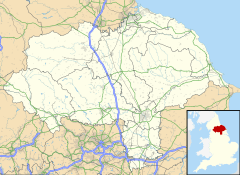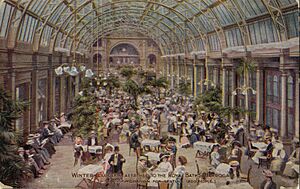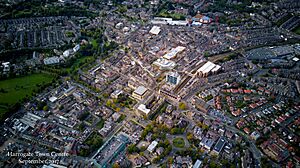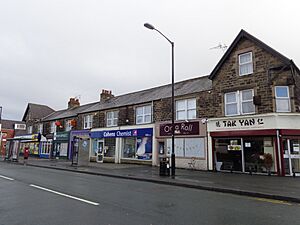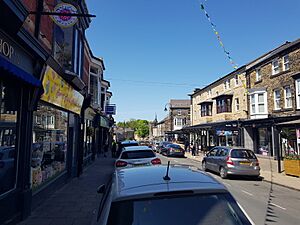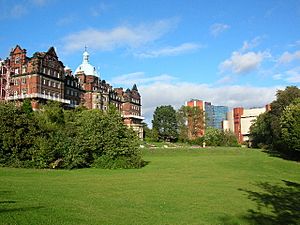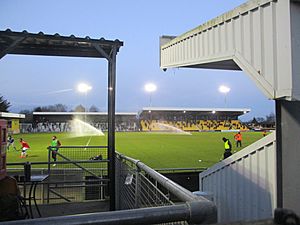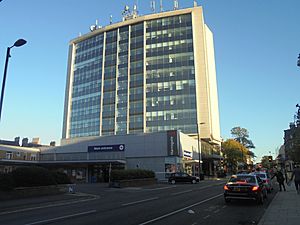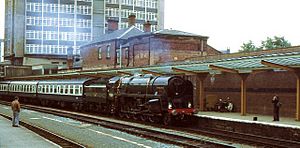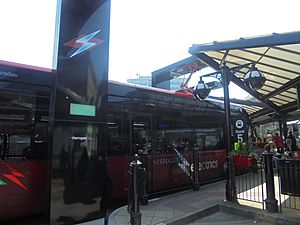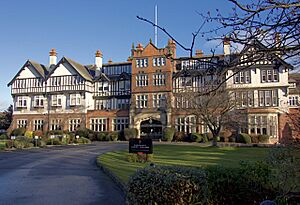Harrogate facts for kids
Quick facts for kids Harrogate |
|
|---|---|
| Town | |
|
|
Coat of arms |
|
| Population | 75,070 (mid-2016 ONS estimate) |
| OS grid reference | SE303550 |
| • London | 180 mi (290 km) SSE |
| Unitary authority |
|
| Ceremonial county | |
| Region | |
| Country | England |
| Sovereign state | United Kingdom |
| Post town | HARROGATE |
| Postcode district | HG1, HG2, HG3 |
| Dialling code | 01423 |
| Police | North Yorkshire |
| Fire | North Yorkshire |
| Ambulance | Yorkshire |
| EU Parliament | Yorkshire and the Humber |
| UK Parliament |
|
Harrogate is a special spa town in North Yorkshire, England. It's a popular place for tourists, who come to enjoy its spa waters and beautiful gardens like RHS Harlow Carr. It's also close to the stunning Yorkshire Dales National Park.
Harrogate started as two smaller villages, High Harrogate and Low Harrogate, in the 1600s. For a few years (2013-2015), people voted Harrogate as 'the happiest place to live' in Britain! The spa water in Harrogate has natural minerals like iron and sulphur. The town became known as 'The English Spa' in the 1700s after its special waters were found in the 1500s. These waters helped many people feel better, which made the town rich.
You can get to Harrogate by train or bus, as it has its own train and bus stations. Leeds Bradford Airport is only about 16 km (10 mi) away. Major roads like the A61 connect Harrogate to Leeds and Ripon, and the A59 links it to York and Skipton. In 2011, Harrogate had about 73,576 people living there.
The town's motto is Arx celebris fontibus, which means "a citadel famous for its springs".

Contents
What's in a Name?
The name Harrogate was first written down in the 1330s. We're not totally sure where the name comes from. It might mean 'road to the cairn' (a pile of stones) from an old Norse word. Another idea is that it means "the way to Harlow," which is a nearby place.
Harrogate's History
In the Middle Ages, Harrogate was a small place on the edge of two areas: Bilton and Pannal. In 1372, King Edward III gave the Royal Forest area to his son, John of Gaunt. This made the Duchy of Lancaster the main landowner in Harrogate.
Harrogate grew because of its special spring water, which was rich in iron and sulphur. The first spring was found in 1571 by William Slingsby. He noticed the water was like the healing waters in Spa, Belgium. A doctor named Edmund Deane wrote a book about the water in 1626, making it famous.
More springs were found in the 1600s and 1700s. Many visitors came to drink the waters. Inns and hotels like the Queen's Head and the Crown Hotel opened to welcome them.
In 1778, a large area of land called The Stray was set aside as a public park. This area, which includes many of the springs, is still public today. This helped Harrogate grow, especially the area between High and Low Harrogate. The Royal Pump Room was built in 1842 to protect the main sulphur well.
In 1870, an inventor named Samson Fox created a new way to make gas for lighting. He lit Parliament Street in Harrogate with this new gas, making it the first street in the world to have water-gas lighting! He also gave the town its first fire engine and built a theatre. He was mayor for three years in a row.
After the First World War, Harrogate's popularity as a spa town went down. During the Second World War, many government offices moved to Harrogate's large hotels. This helped the town become a big centre for business meetings and exhibitions.
In 2007, a huge Viking treasure called the Harrogate hoard was found near the town. It had almost 700 coins and other items from places as far away as Afghanistan! Experts at the British Museum said it was the most important find of its kind in Britain for 150 years.
How Harrogate is Governed
In 1884, Harrogate became a special town called a Municipal Borough. Over the years, it grew and included nearby areas like Bilton and Starbeck. In 1974, Harrogate became part of the larger Borough of Harrogate in North Yorkshire.
The person who represents Harrogate in the UK Parliament is Tom Gordon, a Liberal Democrat. He was elected in 2024. The town is now governed by North Yorkshire Council.
Twin Towns
Harrogate has friendly links with towns in other countries. These are called "twin towns":
- Bagnères-de-Luchon, France (since 1953)
- Barrie, Canada (since 2013)
- Montecatini Terme, Italy (since 1963)
- Wellington, New Zealand (since 1953)
Harrogate's Location and Weather
Harrogate is a good place to live for people who work in nearby cities like Leeds and York. It's a wealthy town with some of the highest house prices in England. Many homes here are worth £1 million or more.
Harrogate is on the edge of the Yorkshire Dales. It has a mild and dry climate. The town is quite high up, between 100 and 200 metres above sea level. In January, the average low temperature is just below 1 °C (34 °F), and in July and August, the average high is 21 °C (70 °F).
Climate
Harrogate has a warm and mild climate with rain throughout the year. The average yearly temperature is 8.9 °C (48 °F). The average rainfall is 742 mm (29 inches) per year.
| Climate data for Climate data for Harrogate | |||||||||||||
|---|---|---|---|---|---|---|---|---|---|---|---|---|---|
| Month | Jan | Feb | Mar | Apr | May | Jun | Jul | Aug | Sep | Oct | Nov | Dec | Year |
| Record high °C (°F) | 16 (61) |
17 (63) |
22 (72) |
25 (77) |
30 (86) |
32 (90) |
34 (93) |
33 (91) |
29 (84) |
27 (81) |
20 (68) |
17 (63) |
34 (93) |
| Mean daily maximum °C (°F) | 6.9 (44.4) |
7.5 (45.5) |
10.0 (50.0) |
12.6 (54.7) |
16.0 (60.8) |
18.8 (65.8) |
21.2 (70.2) |
20.8 (69.4) |
18.0 (64.4) |
13.9 (57.0) |
9.7 (49.5) |
6.9 (44.4) |
13.6 (56.5) |
| Mean daily minimum °C (°F) | 0.8 (33.4) |
0.9 (33.6) |
2.4 (36.3) |
3.9 (39.0) |
6.7 (44.1) |
9.7 (49.5) |
11.8 (53.2) |
11.6 (52.9) |
9.5 (49.1) |
6.6 (43.9) |
3.3 (37.9) |
0.9 (33.6) |
5.7 (42.3) |
| Record low °C (°F) | −16 (3) |
−10 (14) |
−13 (9) |
−3 (27) |
1 (34) |
2 (36) |
5 (41) |
5 (41) |
−1 (30) |
−4 (25) |
−8 (18) |
−11 (12) |
−16 (3) |
| Average precipitation mm (inches) | 52.7 (2.07) |
39.9 (1.57) |
44.9 (1.77) |
50.1 (1.97) |
43.8 (1.72) |
58.0 (2.28) |
53.2 (2.09) |
62.4 (2.46) |
46.9 (1.85) |
57.7 (2.27) |
57.8 (2.28) |
55.8 (2.20) |
626.0 (24.65) |
| Average precipitation days | 11.1 | 9.1 | 9.5 | 9.3 | 9.1 | 9.3 | 8.9 | 10.0 | 8.6 | 10.4 | 11.3 | 10.7 | 117.2 |
| Mean monthly sunshine hours | 40 | 59 | 98 | 141 | 190 | 218 | 229 | 203 | 156 | 103 | 65 | 47 | 1,548 |
| Source: Met Office | |||||||||||||
 |
NW: Pateley Bridge | Ripon | NE: Boroughbridge |  |
| Skipton | Knaresborough, York | |||
| SW: Otley | Leeds | SE: Wetherby |
Areas of Harrogate
- Central Harrogate is the main shopping area. You'll find big shops and the Victoria Shopping Centre here. Parliament Street and James Street have more fancy shops. There's also an Odeon cinema and supermarkets. Many restaurants and bars are on Cheltenham Crescent.
- Oatlands is a rich area in the south with two schools and allotments.
- Woodlands is a large area in the south-east. It's home to Harrogate Town F.C., a primary school, and supermarkets.
- Bilton is a big area with many churches, shops, and schools. Poets' Corner is known for its 'poetic' street names and expensive houses. The Bilton Gala is a fun event held here every May.
- Jennyfields is a modern area in the north-west with two schools and the town's main swimming pool.
- The Duchy estate is near the town centre, with large houses and private schools like Harrogate Ladies' College.
- Starbeck is a large area to the east with a train station and bus services. It has schools, churches, and shops.
- Pannal is south of Harrogate and still feels like a village. It has a train station.
- High Harrogate is east of the town centre, with shops and cafes.
- Low Harrogate is west of the town centre and is where most tourists go. You'll find the Royal Pump Room, Mercer Art Gallery, and the Valley Gardens here.
- Harlow Hill is west of the town, known for RHS Harlow Carr gardens. The Harrogate Spring Water bottling plant is also here.
- New Park is a small area north of Harrogate with a primary school.
- Wheatlands is a rich area south of The Stray, with two high schools.
- Knox, north of town, is separated from Bilton by green fields.
- Hornbeam Park is a newer area with offices, Harrogate College, a fitness centre, and a train station.
- Fulwith Mill Lane has been named the most expensive road in Yorkshire several times. Houses here can be worth over £3 million.
Economy: How Harrogate Works
Shopping and Dining
Harrogate has a busy and varied economy. The main shopping areas are Cambridge Street and James Street. You can find many different shops, from big brands to small, unique boutiques.
Eating out is very popular in Harrogate. There are many restaurants, from independent places to well-known chains, especially on Parliament Street and Cheltenham Parade.
Conferences and Exhibitions
A big part of Harrogate's business is hosting conferences and exhibitions. The Harrogate International Centre is one of the largest in the UK. It brings in over £150 million to the local economy each year and attracts more than 350,000 business visitors. During the COVID-19 pandemic, it was even set up as a Nightingale Hospital to help.
The town also has the Great Yorkshire Showground, which hosts the famous Great Yorkshire Show and Harrogate Flower Shows. These events bring many visitors and support the town's hotels.
Local Companies
Harrogate is home to some well-known companies:
- Taylors of Harrogate makes Yorkshire Tea, which is sold all over the world.
- Harrogate Spring Water is bottled and exported from here.
- Farrah's Toffee and Harrogate Blue cheese are also made in the town.
Other companies based in Harrogate include:
- Bettys and Taylors of Harrogate – famous tea rooms and bakers.
- Old Swan Hotel – a historic hotel.
- Transdev Blazefield – a bus company.
Military Presence
There are two military sites near Harrogate: the Army Foundation College and RAF Menwith Hill, which is an electronic monitoring station.
Famous Landmarks
Harrogate has many beautiful buildings. St Wilfrid, Duchy Road is a very important building, known for its amazing design. The Jubilee Memorial in Station Parade celebrates Queen Victoria's 50 years as queen.
Montpellier Quarter
The Cenotaph, a war memorial, is a key landmark in the town centre. Bettys is a very popular tea room that opened in 1919.
The Mercer Art Gallery has about 2,000 artworks, mostly from the 1800s and 1900s. You can see paintings by famous artists like William Powell Frith and Dame Laura Knight.
Buildings on Crescent Gardens
Crescent Gardens is an open area surrounded by some of Harrogate's main attractions:
- The Royal Hall theatre is a beautiful old building. It's the only surviving Kursaal (a type of grand public hall) in Britain. It was fully restored and reopened in 2008.
- The Royal Pump Room is next to the gardens. It has Europe's strongest sulphur well and is now a museum about the town's spa history.
Parks and Gardens
The Valley Gardens is Harrogate's main park. It has an ice-cream shop, a children's play area with a paddling pool, a skate park, and mini golf. The Sun Pavilion in the park can be rented for events.
The Stray is a large open parkland in the middle of town. It was created in 1778 to protect the springs. It's always been a public space.
RHS Harlow Carr gardens are on the western edge of Harrogate. These award-winning gardens are the main gardens for the Royal Horticultural Society in the North of England.
Harrogate also has smaller parks like The Softpot Garden and Jubilee Gardens.
Culture and Arts
On 11 January 1900, the Harrogate Grand Opera House, now called Harrogate Theatre, opened.
Since 1966, Harrogate has hosted the Harrogate International Festivals. This is a big arts festival in the North of England. It includes events like the Theakstons Old Peculier Crime Writing Festival and the Harrogate Music Festival.
Harrogate hosted the Eurovision Song Contest 1982 at the Harrogate International Centre.
Harrogate has won awards for its beautiful flowers, including 'Britain in Bloom' in 2003 and 2016. In 2005, a TV show called Harrogate the UK's third best place to live.
The town has two orchestras: Harrogate Symphony Orchestra and Harrogate Philharmonic Orchestra. Harrogate also has a lively underground music scene with heavy metal and punk rock bands.
Sports in Harrogate
Cycling
On 5 July 2014, Harrogate was the finish line for the first stage of the 2014 Tour de France. Huge crowds came to watch, and it was shown on TV around the world. The town has also hosted stages of the Tour de Yorkshire and the finish line for all races in the 2019 UCI Road World Championships.
Football
Harrogate Town AFC plays at Wetherby Road Stadium. They are in EFL League Two, which is the fourth level of English football. They have a local rivalry with Harrogate Railway Athletic F.C..
Harrogate RUFC is a rugby team that moved to a new ground on Rudding Lane.
Cricket
Harrogate Cricket Club is home to the Yorkshire Women cricket team. The club's ground, St George's Road, used to host county games. After a fire in 2008, the pavilion was rebuilt.
Harrogate Cricket Club has four Saturday teams. The 1st XI plays in the Yorkshire Premier League North. Bilton Cricket Club also offers cricket for all ages.
Field Hockey
Harrogate Hockey Club plays field hockey in various leagues, including the Women's England Hockey League.
Other Sports
The Olympic Cauldron for the 2012 London Olympics was built in Harrogate!
Harrogate Harriers and Nidd Valley Road Runners are local running clubs. Harrogate District Swimming Club has teams that compete at a national level. You can also enjoy rock climbing at the Harrogate Climbing Centre or at nearby outdoor spots like Almscliffe Crag and Brimham Rocks.
Getting Around Harrogate
Trains
Harrogate has four train stations: Harrogate, Hornbeam Park, Pannal, and Starbeck. Trains run to Leeds and York. You can also catch a train directly to London King's Cross every two hours.
There used to be train lines to Tadcaster and Wetherby, but they were closed in the 1960s. Many people want to see the old line to Ripon reopened.
Buses
Bus services are mainly run by The Harrogate Bus Company and Connexions Buses.
- Route 36: Buses run every 10 minutes between Harrogate and Leeds, and every 30 minutes to Ripon.
- Route 1: Buses run every 10 minutes to Knaresborough.
- Route 7: Runs to Leeds via Wetherby.
- Other routes connect Harrogate to places like Otley, Bradford, and local areas within the town.
Harrogate bus station is in the town centre. Since 2018, all local bus routes within Harrogate use electric buses.
Roads
Major roads connect Harrogate to other towns and cities. The A61 goes to Leeds and Ripon. The A59 links Harrogate to York and Skipton. The A658 is a bypass around the south and east of the town.
Airports
The closest airport is Leeds Bradford Airport, about 16 km (10 mi) away. You can get there by bus or train.
Education in Harrogate
Harrogate has many schools and colleges:
- Ashville College
- Harrogate College
- Harrogate Grammar School (known for languages and technology)
- Harrogate High School (known for sports)
- Harrogate Ladies' College
- Rossett School (known for computing and maths)
- St. Aidan's C of E High School (known for languages and science)
- St John Fisher Catholic High School (known for arts and humanities)
- Army Foundation College
Media and News
- The main local newspaper is the Harrogate Advertiser.
- Online news for the Harrogate area can be found on Stray Ferret and the Harrogate Informer.
- Local radio stations are BBC Radio York and Greatest Hits Radio Harrogate & The Yorkshire Dales.
- TV news is provided by BBC Yorkshire and ITV Yorkshire.
Interesting Facts
- In 2013, 2014, and 2015, Harrogate was voted the "happiest place" to live in the UK.
- In 2014, Harrogate District Hospital was recognized for having the best cancer care in England.
Famous People from Harrogate
- Olly Alexander (born 1990), singer and musician
- Jim Carter (born 1948), actor
- Rachel Daly (born 1991), English Footballer
- Jack Laugher (born 1995), Olympic diver
- David Nobbs (1935–2015), author who created Reginald Perrin
- Hugo Speer (born 1968), actor
See also
 In Spanish: Harrogate para niños
In Spanish: Harrogate para niños
 | Janet Taylor Pickett |
 | Synthia Saint James |
 | Howardena Pindell |
 | Faith Ringgold |







